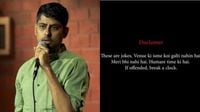Indian comedian, lyricist, and satirist Varun Grover has released a new stand-up video from his ongoing "Nothing Makes Sense" tour, and this time, he’s not mincing words. In light of recent backlash against fellow comedian Kunal Kamra, Grover opened his set with a sharp disclaimer—turning the political heat into punchlines that are both defiant and reflective.
A disclaimer that speaks volumes, Grover begins his routine with: "These are jokes. Venue ki isme koi galti nahi hain. Mera bhi nahin hai. Humare time ki hai. If offended, break a clock." This line is a direct reference to the Kunal Kamra controversy in Mumbai, where Kamra was criticized for making a joke about Maharashtra Deputy Chief Minister Eknath Shinde during a show at Habitat, Khar. The venue was later vandalized by alleged Shiv Sena members, prompting national debate about the safety and freedom of comedians.
Why Grover’s satire hits different is that he used the disclaimer not just as a legal safeguard but as a symbol of the challenges Indian comedians now face. The line "If offended, break a clock" mocks the performative outrage that often sidelines serious discourse in favor of symbolic destruction. He subtly shifts the blame from comedians or venues to the larger social climate, suggesting: "Humare time ki hai"—it’s the times that are broken, not the jokes.
The controversy that set the stage for Grover’s disclaimer erupted earlier this week when Kunal Kamra joked about Eknath Shinde during a live performance. The reaction was swift and severe: political backlash, right-wing protests, and eventually the vandalization of the Habitat venue. Kamra has stood his ground, issuing a strong statement: "I will not apologize. I believe what I said was within my rights as a comedian." His stand triggered support from free speech advocates and fellow artists across India.
Grover’s subtle nod to Munawar Faruqui during the set also highlights the precarious situation for comedians. Faruqui was arrested in 2021 for a joke he never got to deliver. Ironically, Faruqui later appeared on a reality show hosted by Kangana Ranaut, a noted right-wing figure—further emphasizing the paradoxes comedians navigate in India today. Grover joked about the spectacle of comedians being both punished and platformed depending on the mood of the moment.
Who will be affected by the current climate? Comedians and artists are increasingly under pressure to self-censor or face legal and political backlash. Venues and organizers could become potential targets for backlash even without direct involvement. Audiences may witness fewer boundary-pushing performances, stifling artistic growth. Free speech advocates are alarmed by the shrinking space for satire and criticism in public discourse.
How can one take action? Supporting independent art is crucial—follow and fund comedians who speak truth to power. Protecting artistic venues is also vital; there should be clear legal frameworks safeguarding venues from unjust punishment. Staying informed about the laws and limits surrounding artistic expression in your state is necessary, as is raising your voice to defend art as a pillar of democracy—not a threat to it.
The bigger picture is that Varun Grover’s stand-up is not just a performance—it’s a protest in disguise. By cloaking critique in comedy, he’s managed to say what many fear to even whisper. His disclaimer, framed as satire, is a subtle indictment of the very society that requires it. At a time when laughter itself can become a liability, Grover’s message is clear: "Don’t shoot the comedian. Change the script."
Varun Grover’s latest stand-up set captures the essence of comedy in a democracy under duress. By beginning with a now-viral disclaimer, he’s spotlighted the absurdity of silencing art and the resilience of India’s stand-up community. In a climate where a punchline can provoke a protest, Grover’s act is both a defense of freedom and a masterclass in satire.









